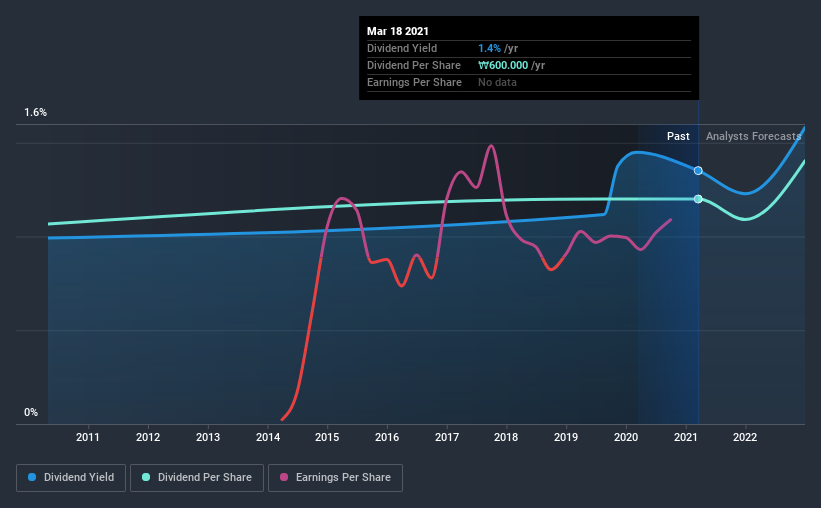- South Korea
- /
- Machinery
- /
- KOSE:A017800
You Have To Love Hyundai Elevator Co., Ltd's (KRX:017800) Dividend

Could Hyundai Elevator Co., Ltd (KRX:017800) be an attractive dividend share to own for the long haul? Investors are often drawn to strong companies with the idea of reinvesting the dividends. Unfortunately, it's common for investors to be enticed in by the seemingly attractive yield, and lose money when the company has to cut its dividend payments.
While Hyundai Elevator's 1.4% dividend yield is not the highest, we think its lengthy payment history is quite interesting. The company also returned around 1.5% of its market capitalisation to shareholders in the form of stock buybacks over the past year. There are a few simple ways to reduce the risks of buying Hyundai Elevator for its dividend, and we'll go through these below.
Click the interactive chart for our full dividend analysis

Payout ratios
Dividends are typically paid from company earnings. If a company pays more in dividends than it earned, then the dividend might become unsustainable - hardly an ideal situation. Comparing dividend payments to a company's net profit after tax is a simple way of reality-checking whether a dividend is sustainable. Looking at the data, we can see that 27% of Hyundai Elevator's profits were paid out as dividends in the last 12 months. This is a middling range that strikes a nice balance between paying dividends to shareholders, and retaining enough earnings to invest in future growth. Besides, if reinvestment opportunities dry up, the company has room to increase the dividend.
Another important check we do is to see if the free cash flow generated is sufficient to pay the dividend. Hyundai Elevator's cash payout ratio in the last year was 26%, which suggests dividends were well covered by cash generated by the business. It's encouraging to see that the dividend is covered by both profit and cash flow. This generally suggests the dividend is sustainable, as long as earnings don't drop precipitously.
While the above analysis focuses on dividends relative to a company's earnings, we do note Hyundai Elevator's strong net cash position, which will let it pay larger dividends for a time, should it choose.
Remember, you can always get a snapshot of Hyundai Elevator's latest financial position, by checking our visualisation of its financial health.
Dividend Volatility
Before buying a stock for its income, we want to see if the dividends have been stable in the past, and if the company has a track record of maintaining its dividend. For the purpose of this article, we only scrutinise the last decade of Hyundai Elevator's dividend payments. The dividend has been stable over the past 10 years, which is great. We think this could suggest some resilience to the business and its dividends. During the past 10-year period, the first annual payment was ₩533 in 2011, compared to ₩600 last year. Dividends per share have grown at approximately 1.2% per year over this time.
Slow and steady dividend growth might not sound that exciting, but dividends have been stable for ten years, which we think is seriously impressive.
Dividend Growth Potential
Dividend payments have been consistent over the past few years, but we should always check if earnings per share (EPS) are growing, as this will help maintain the purchasing power of the dividend. Earnings have grown at around 7.0% a year for the past five years, which is better than seeing them shrink! It's good to see decent earnings growth and a low payout ratio. Companies with these characteristics often display the fastest dividend growth over the long term - assuming earnings can be maintained, of course.
Conclusion
Dividend investors should always want to know if a) a company's dividends are affordable, b) if there is a track record of consistent payments, and c) if the dividend is capable of growing. Firstly, we like that Hyundai Elevator has low and conservative payout ratios. Second, earnings growth has been mediocre, but at least the dividends have been relatively stable. Hyundai Elevator performs highly under this analysis, although it falls slightly short of our exacting standards. At the right valuation, it could be a solid dividend prospect.
Market movements attest to how highly valued a consistent dividend policy is compared to one which is more unpredictable. However, there are other things to consider for investors when analysing stock performance. Taking the debate a bit further, we've identified 1 warning sign for Hyundai Elevator that investors need to be conscious of moving forward.
We have also put together a list of global stocks with a market capitalisation above $1bn and yielding more 3%.
When trading Hyundai Elevator or any other investment, use the platform considered by many to be the Professional's Gateway to the Worlds Market, Interactive Brokers. You get the lowest-cost* trading on stocks, options, futures, forex, bonds and funds worldwide from a single integrated account. Promoted
Valuation is complex, but we're here to simplify it.
Discover if Hyundai Elevator might be undervalued or overvalued with our detailed analysis, featuring fair value estimates, potential risks, dividends, insider trades, and its financial condition.
Access Free AnalysisThis article by Simply Wall St is general in nature. It does not constitute a recommendation to buy or sell any stock, and does not take account of your objectives, or your financial situation. We aim to bring you long-term focused analysis driven by fundamental data. Note that our analysis may not factor in the latest price-sensitive company announcements or qualitative material. Simply Wall St has no position in any stocks mentioned.
*Interactive Brokers Rated Lowest Cost Broker by StockBrokers.com Annual Online Review 2020
Have feedback on this article? Concerned about the content? Get in touch with us directly. Alternatively, email editorial-team (at) simplywallst.com.
About KOSE:A017800
Hyundai Elevator
Designs, manufactures, installs, maintains, and modernizes elevators in South Korea and internationally.
Adequate balance sheet and slightly overvalued.

